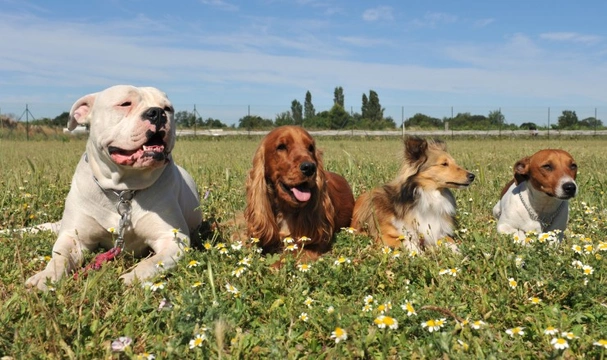
Five disadvantages of owning two or more dogs
While the majority of dogs in the UK (by a slim margin) live as the only dog in their household, a significant proportion of people own two or more dogs at once, in what is known as a multi-pet or multi-dog household. Keeping two or even more dogs together works out very well for a lot of people, and there are undoubtedly a lot of plus sides to keeping more than one dog, such as the socialisation benefits, enablement of natural pack behaviour, and the advantages of having a reassuring friend to hand to provide company and friendship.
However, owning two or more dogs is not an endeavour to be undertaken lightly, and this option is not suitable for all dog owners, depending on the lifestyle and other factors relating to the owner themselves, and also the temperament of the individual dogs as well.
In this article, we will look at five of the main disadvantages of keeping two or more dogs together. Read on to learn more!
Not all dogs get on well with others
While dogs are naturally pack animals that would, in the wild form their own social groups and hierarchical structures, this does not mean that throwing any combination of two or more dogs together will work out perfectly! Not all dogs get on well with others, and while dogs kept together will generally sort themselves out over time when it comes to sorting out their differences and striking a happy medium, in some cases, constant tension and problems can ensue.
In the wild, if two dogs really do not get on and cannot sort themselves out when it comes to disagreements, ultimately one dog will leave or be pushed out of the pack to go out on their own, but within the domestic home, this obviously does not happen.
You must assess the individual personalities of each of your dogs carefully to ensure that they can get on well together and live happily side by side.
If you need to separate the dogs, this can be a problem
Keeping more than one dogs together means that the dogs can provide company for each other, which can help with separation anxiety and take some of the pressure off the owner when it comes to keeping the dogs entertained when you are out.
One dog that suffers from acute separation anxiety will generally be a lot calmer and quicker to settle when left if they have a friend with them, but all of this does mean that if your dogs are used to always being together, they may not be so used to spending time on their own. This means that separation anxiety can actually be worse when the dogs have to be separated or one dog left alone, as they are simply not used to not having a constant companion.
You will need to separate your dogs for some things
While you may think that your pack of dogs are likely to be together at all times and do everything together, your dogs will still need to be separated from each other sometimes nonetheless. Training is something that should be done individually with each dog, and other things such as trips to the vet are generally undertaken one by one too.
Added to this, one of your dogs will obviously ultimately outlive the other, and the remaining dog is very likely to grieve and pine for their lost friend, at the same time as having to get used to life on their own, and all that that involves.
Dogs can learn bad habits from each other!
Dogs learn an awful lot through observation, and a large part of this involves learning from other dogs. This is how dogs learn to behave well with others and pick up the appropriate parameters of good socialisation behaviours, and sometimes, can help to make a shy dog bolder, or less likely to display acute anxiety in certain situations if the other dog is calm.
However, it also means that as well as good habits and positive traits, dogs are also very quick to pick up bad habits from each other, and this can be a problem! Dealing with one dog that loves to dig tunnels in your garden or rip up your furniture can be a huge issue, but if your other dog learns from observation that this looks like great fun and must be ok because the other dog is doing it, you will have twice the issue, and getting it under control can be more difficult!
The financial cost of more than one dog is higher
Obviously, the cost of owning two or more dogs will be exponentially more expensive than owning just one! While the cost will not generally double for two dogs because in many instances you can benefit from economies of scale, such as by buying larger bags of dog food which generally work out to be better value, the financial commitment involved in keeping two or more dogs is still significant.
As well as double the food, you will also need to dedicate twice the funds to other things too, including insurance, veterinary care, wormers and flea treatments. Owning two or more dogs can be an expensive luxury that not every dog lover can hope to fund!



